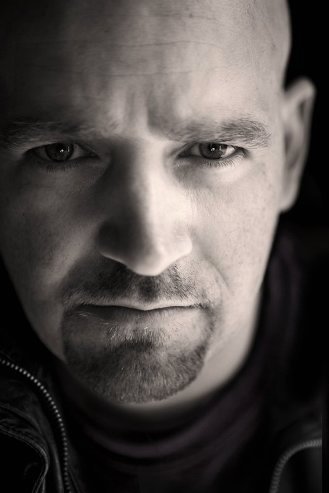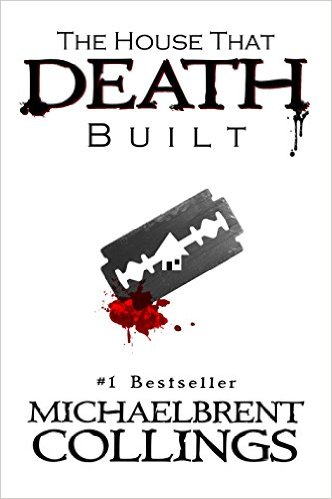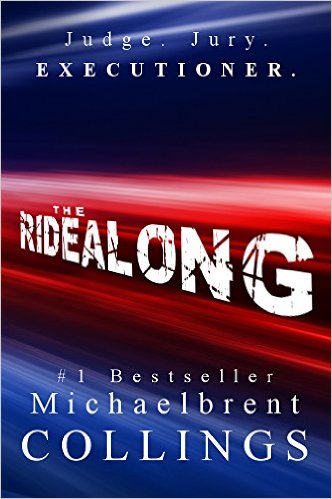

IN THE "SPECIAL PAGE" ARCHIVES:
Thomas Smith
Bentley Little
Joe R. Lansdale
W.D. Gagliani
Tim Waggoner
Jay Wilburn
Simon Clark
Ellen Datlow
Writing for a Young Adult Audience – Oh! The Horror!
by Michaelbrent Collings
Recently my novel The Ridealong was nominated for a Bram Stoker Award ™ for Superior Achievement in a Young Adult Novel. I had the usual reaction for someone in this situation, which involves public nudity; three cherry tomatoes; and seven lawn gnomes of varying heights, at least one of whom must be of the "grumpy gnome" sub-class.
After I settled down a bit, and the police were finally convinced by my high-priced attorneys (they're not really attorneys, but several of my relatives own briefcases and have all their teeth!) that the issue was the fault of anti-psychotics and an overdose of Twinkies, I settled down to think many Deep Thoughts.
The vagaries of writing for a YA audience in horror was precisely none of these thoughts. Though I did come up with a new snickerdoodle recipe.
That said, I was soon thereafter contacted by The Horror Zine to talk about writing horror for a YA audience, and since bail had been denied (hey, I never said Uncle Cletus and Aunt Jeb were good attorneys), I did have some time on my hands, so….
So what is the deal with writing horror for a YA audience? Is there a difference between writing that and "real" horror? Can you write the same stuff in both? Could Stephen King have slapped a glowing vampire on the cover of The Shining and sold the thing otherwise as-is and gotten away with it?
The fact is: probably.
We tend to have an image of teens, tweens, and other -eens as iPod-listening, YouTube-watching, video-game-playing quasi-oafs whose main goals in life are to pop zits and to bang other iPod-listening, YouTube-watching, etc., oafs.* The reality is much more complicated.
They are people who have graduated childhood but who, either culturally or of their own personal leanings, are not ready for the full onus of adult responsibility. They are people who want to have the entirety of human experience opened to them, but do not necessarily want the entirety of human consequence placed upon their shoulders.
But when we step back, most of us want much the same. How many of us, how many "good, grown-up adults" have, at one time or another, wished we didn't have a job, didn't have kids, didn't have bills, didn't have all those things that made us "good, grown-up adults"?
The line between what makes us adults and what makes "them" merely young adults is thinner than the paper upon which we write our stories.
In The Ridealong, the main character is Mel, a teenage girl who lost her mother at an early age and who recently nearly lost her father, a police officer, when he was involved in a shooting that cost him the lives of his partner and an innocent child. After a month off – a mandatory leave of absence for the internal affairs investigation into the shooting – her father is cleared and she is faced with the terrifying prospect of his return to a job that separates her from him. Emotionally. Physically.
Perhaps, if she is unlucky, permanently.
Seeing her terror, he lets her come with him on his first night back, driving in his squad car on a ridealong. And the first stop is a doozy: a homicide of a friend, with copious evidence at the scene that Mel and her father were the killers. What follows is a non-stop chase through the night, with a madman on the police band radio who leads them from one dead friend to the next, all the while hinting that if they can get ahead of him, they can end the game, but if they can't, the last bodies on the list will be theirs.
Now, change "Mel is a teenager" to "Mel is the officer's wife" or "Mel is the officer's partner." They all work equally well. The bones of the story are about what, then? The threat of familial loss. The pain of identity being stolen as a killer strips away everything that anchors the protagonist to her life. The potential for permanent incarceration, for madness itself if things go too far.
All things that we "grown ups" understand all-too-well.
The reality is that teens are surprisingly sophisticated, both in their vocabulary and in their storytelling methods. We clean up the language a bit (there are fewer "like"s and "you know"s in a YA story than in a real life YA conversation – happily), but other than that, many a "YA" story is really a "grown up" story that has a teen as the point of view character, and sometimes the story takes place in or starts out in a teen-associated milieu, like a school.
There has been a boom of YA titles in recent years – horror, scifi, and fantasy in particular. And who is buying all those books?
We grown-ups.
Because we aren't really reading YA. We're reading grown-up books.
We all want the same things. Physical sustenance, shelter, emotional support, love. We go about them in slightly different ways, but that's just mechanics – it's like saying "do you start out mixing in the sugar or the flour when you're making a cake? Do you like fondant or buttercream frosting at the end?"
But it's all cake underneath. The more we can remember that, the wider an audience we will be able to reach and – perhaps most importantly for we who write horror, i.e., for we who teach the most important lessons – the most hearts we will be able to pry open with our sharp, dark knives; pour in our poison; and then watch as they heal into something better and far brighter than they ever would have been before our stories became part of their souls.
* Ironically, I think many of us get these images from other horror movies. Go figure.
About Michaelbrent Collings

Michaelbrent Collings is an internationally-bestselling author, produced screenwriter, and multiple Bram Stoker Award™ nominee. You can find out more about him and his books HERE, or sign up for his mailing list (and get a free book) at http://eepurl.com/VHuvX.


